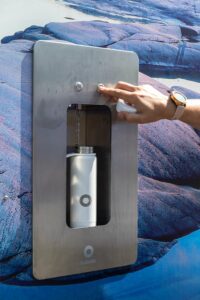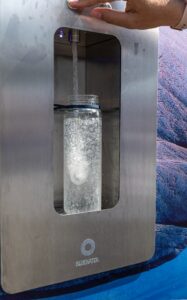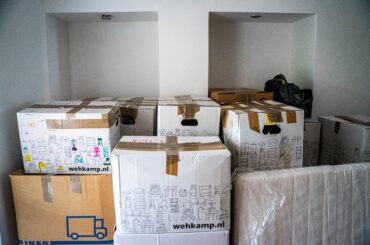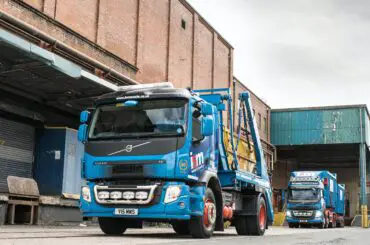In today’s world, where sustainability and waste reduction have become pressing concerns, refiller businesses have emerged as champions of change. Refilleries offer a unique shopping experience centered around eco-friendly principles and eliminating packaging waste. These businesses allow customers to refill their containers with a wide range of package-free, sustainable products. The concept of a refiller is rooted in the belief that small actions, like choosing package-free alternatives, can significantly impact the environment.
Sustainability and waste reduction are critical issues facing our planet today. Traditional shopping practices generate vast amounts of packaging waste, contributing to landfills and pollution. Refilleries address this challenge by encouraging customers to reuse containers and avoid single-use packaging altogether. By offering package-free options, refiller businesses actively promote waste reduction, helping to conserve resources, minimize landfill waste, and reduce pollution.
There has been a growing interest in package-free and eco-friendly products in recent years. Consumers are increasingly seeking alternatives to single-use plastics and actively looking for businesses that align with their sustainability and environmental responsibility values. Refilleries have tapped into this rising demand by providing a sustainable shopping experience that empowers customers to make environmentally conscious choices.
As sustainability continues to gain momentum and consumers prioritize eco-friendly options, starting a refiller business presents a unique opportunity for entrepreneurs. By embracing the refillery model, you can contribute to the global movement towards waste reduction and provide customers with an accessible and convenient way to impact the environment positively.
Contents
- 1 Why Start a Refillery Business
- 2 Market Research and Planning
- 3 Legal and Financial Considerations
- 4 Location and Store Setup
- 5 Supplier and Product Selection
- 6 Inventory Management and Sustainability Practices
- 7 Marketing and Promotion
- 8 Operations and Customer Experience
- 9 Scaling and Future Growth
- 10 Conclusion
Why Start a Refillery Business
Starting a refiller business offers numerous compelling reasons, making it an attractive venture for entrepreneurs passionate about sustainability. Let’s explore the key factors that make starting a refiller business worthwhile.
1. Environmental Benefits:
Refillery businesses have a profound positive impact on the environment. By promoting the use of package-free and sustainable products, refillers contribute to reducing the staggering amount of waste generated by traditional shopping practices. Eliminating single-use packaging significantly reduces landfill waste and decreases the demand for new packaging materials, conserving valuable resources. Refilleries also minimize pollution, as many conventional packaging materials, such as plastics, have detrimental effects on ecosystems when they end up in our oceans and natural habitats. By embracing the refiller model, entrepreneurs have a unique opportunity to actively participate in the fight against waste and contribute to a more sustainable future.
2. Growing Market Demand:
There is an increasing market demand for sustainable and package-free options. Consumers are becoming more conscious of their choices environmental impact and actively seeking alternatives to single-use plastics and excessive packaging. Refilleries cater to this growing consumer interest by providing a convenient and accessible way for individuals to adopt eco-friendly shopping practices. Refillers tap into a market segment that values sustainability, ethical consumption, and waste reduction by offering a wide range of package-free products. Entrepreneurs who start a refillery business position themselves at the forefront of this evolving market and meet the demands of a discerning and environmentally conscious customer base.
3. Profitability and Long-Term Growth:
Beyond the environmental benefits, refiller businesses hold substantial potential for profitability and long-term growth. As sustainability becomes a mainstream concern, more consumers are willing to support businesses that align with their values. Refilleries, with their unique value proposition and focus on sustainability, have the opportunity to build strong customer loyalty and attract a dedicated customer base. Additionally, the potential for cost savings in packaging materials and logistics can contribute to improved profit margins. As the refillery market expands and consumer awareness grows, entrepreneurs who establish a solid brand presence and deliver exceptional customer experiences can position themselves for long-term success and contribute to a sustainable bottom line.
Market Research and Planning
Conducting thorough market research and effective planning are essential steps to ensure the success of your refillery business. Let’s explore the key components of this stage:
1. Conducting Market Research:
Conduct comprehensive market research to establish a strong foundation for your refiller business. This involves identifying your target audience and understanding their preferences, needs, and purchasing behaviors. Explore your potential customers’ demographic and psychographic characteristics to tailor your offerings accordingly. Additionally, analyze the competition in your area to identify their strengths, weaknesses, and unique selling points. This research will help you position your refiller effectively and differentiate yourself from competitors.
2. Defining Your Unique Selling Proposition and Niche:
With a growing number of refillery businesses, defining your unique selling proposition (USP) is crucial and carving out a niche within the refillery market is crucial. Identify what sets your refiller apart from others. It could be a specific focus on certain sustainable products, a commitment to local sourcing, or exceptional customer service. By defining your USP and niche, you can effectively target and attract customers who resonate with your values and offerings.
3. Developing a Comprehensive Business Plan:
A comprehensive business plan is essential for guiding your refiller business and securing financing. Start by outlining your mission, vision, and goals. Define your target market and competitive landscape. Develop a pricing strategy that considers costs, margins, and market trends. Create detailed financial projections, including startup costs, revenue forecasts, and expense budgets. Identify the resources and equipment required to operate your refiller efficiently. Additionally, devise a marketing strategy incorporating online and offline channels to reach and engage your target audience.
By conducting thorough market research, defining your unique selling proposition, and developing a comprehensive business plan, you lay the groundwork for a successful refiller business. These steps will help you understand your target market, differentiate your offerings, and set realistic goals for your business’s financial growth. Market research and planning are the blueprints for your refillery venture, guiding your decisions and positioning you for success in the competitive marketplace.
Legal and Financial Considerations
When starting a refiller business, it’s important to address your venture’s legal and financial aspects.
1. Choosing the Appropriate Legal Structure:
Selecting the right legal structure for your refiller business is crucial. Common options include sole proprietorship, partnership, limited liability company (LLC), or corporation. Each structure has advantages and considerations, such as liability protection, tax implications, and ease of operation. Consult with an attorney or business advisor to determine the best structure that aligns with your goals and provides the legal framework for your refiller business.
2. Registering Your Business Name and Obtaining Permits and Licenses:
Please choose a unique and memorable name for your refiller business and register it with the appropriate government authorities. Conduct a thorough search to ensure the name is available and does not infringe on trademarks. Identify the permits and licenses required to operate a refiller in your location. These may include health permits, zoning permits, environmental permits, and retail licenses. Compliance with local regulations is essential to operate legally and avoid potential penalties or disruptions to your business.
3. Assessing Startup Costs and Exploring Funding Options:
To launch your refiller business, you must assess your startup costs and explore funding options. Start by creating a detailed budget that includes expenses such as store setup, equipment, inventory, marketing, and employee wages. Research suppliers and estimate the costs of acquiring sustainable, package-free products—additionally, factor in ongoing expenses such as rent, utilities, and insurance. If you require additional funds, explore financing options such as personal savings, small business loans, crowdfunding, or investor partnerships. Prepare a comprehensive business plan and financial projections for potential lenders or investors.
You lay the groundwork for a solid and compliant refiller business by addressing the legal and financial considerations. Choosing the appropriate legal structure provides the necessary framework for operations and protects your assets. Registering your business name and obtaining the required permits and licenses ensure you meet regulatory requirements. Assessing startup costs and exploring funding options enable you to secure the necessary capital to bring your refiller business to life. Taking care of these considerations sets a strong foundation for the success and sustainability of your refillery venture.
Location and Store Setup
Choosing the right location and optimizing your store setup is crucial to establishing a successful refiller business.
1. Finding a Suitable Retail Space:
When selecting a location for your refiller, prioritize areas with high foot traffic and easy accessibility. Look for neighborhoods or commercial areas that align with your target market demographics and strongly focus on sustainability and eco-consciousness. Consider proximity to residential areas, schools, offices, or other complementary businesses. Additionally, evaluate the cost of rent or lease agreements and negotiate favorable terms that align with your budget and long-term growth plans.
2. Optimizing Store Layout:
Designing an efficient and attractive store layout is essential to enhance the customer experience and maximize sales. Consider the flow of traffic within your store and strategically position product displays, checkout counters, and refill stations to ensure a smooth and intuitive shopping experience. Create dedicated sections for different product categories and use signage or labeling to guide customers through the store. Prioritize visibility and accessibility for your key products and emphasize sustainable packaging alternatives. Consider incorporating eco-friendly and visually appealing elements, such as natural materials or greenery, to enhance the overall ambiance.
3. Selecting the Right Equipment, Shelving, and Storage Solutions:
Choose equipment, shelving, and storage solutions that meet the specific needs of your refiller business. Invest in dispensing equipment that allows customers to refill their containers efficiently and without product waste. Consider installing bulk dispensers, gravity bins, or pumps for liquids and sturdy scales for accurate measurements. Select shelving and display units that showcase your products effectively and accommodate various sizes and shapes. Invest in storage solutions that help you organize your inventory, ensuring efficient restocking and minimizing waste.
By finding a suitable retail space, optimizing your store layout, and selecting the right equipment, shelving, and storage solutions, you create a welcoming and functional environment for your refiller business. A well-chosen location with high foot traffic and accessibility increase the visibility and reach of your store. An optimized layout enhances the customer experience and encourages the exploration of your sustainable product offerings. Thoughtfully selected equipment, shelving, and storage solutions improve operational efficiency and ensure smooth inventory management. Considering these factors sets the stage for a successful and customer-centric refiller business.
Supplier and Product Selection
Choosing the right suppliers and curating a diverse range of sustainable products are key elements of a successful refillery business. Consider the following factors when selecting suppliers and products for your refillery:
1. Sourcing Eco-Friendly and Package-Free Products:
Partner with reputable suppliers that offer eco-friendly and package-free products. Research suppliers that prioritize sustainability, ethical sourcing, and environmentally responsible practices. Ensure their products align with your values and meet your customers’ expectations. Look for suppliers that offer various package-free alternatives, including personal care items, cleaning products, pantry staples, and more. Verify their commitment to sustainable packaging, ingredient transparency, and ethical production methods.
2. Building Relationships with Manufacturers and Distributors:
Establish strong relationships with manufacturers and distributors who share your commitment to sustainability. Communicate your business values and objectives to potential partners, emphasizing the importance of eco-friendly and package-free options. Collaborate with suppliers open to customizing or co-creating products tailored to your target market’s needs. Building strong relationships with manufacturers and distributors enables you to stay updated on the latest sustainable products and gain access to exclusive offerings.
3. Curating a Diverse Range of Sustainable Products:
Curate a diverse range of sustainable products based on customer demand and preferences. Conduct surveys or engage with your target market to understand their needs and preferences. Offer a variety of eco-friendly alternatives, including organic, vegan, fair trade, and locally sourced products. Consider providing educational materials or labeling that highlight each product’s environmental benefits and ingredients. Regularly evaluate and refresh your product offerings based on market trends, customer feedback, and emerging sustainable innovations.
By sourcing eco-friendly and package-free products from reputable suppliers, building strong relationships with manufacturers and distributors, and curating a diverse range of sustainable products, you establish a compelling product selection for your refillery business. Offering a wide array of high-quality, environmentally conscious options attracts customers who prioritize sustainability and ethical consumption. Building trust with suppliers and consistently evaluating your product range ensures that your refiller stays aligned with market demand and continues to meet the evolving needs of your customers.
Inventory Management and Sustainability Practices
Implementing effective inventory management and embracing sustainability practices are essential for a successful and environmentally conscious refillery business. Consider the following strategies to optimize inventory management and reduce waste:
1. Implementing Inventory Management Systems:
Utilize inventory management systems or software to track stock levels, monitor sales trends, and streamline restocking processes. These systems help you maintain optimal inventory levels, preventing stockouts and excessive inventory. By accurately tracking product demand, you can make informed purchasing decisions and minimize waste from overstocking or expired products.
2. Developing Sustainable Packaging Solutions and Refill Systems:
Focus on sustainable packaging solutions to reduce waste and promote eco-friendly practices. Explore alternatives to traditional single-use packaging, such as refillable containers, bulk dispensers, or reusable packaging options. Encourage customers to bring their containers or provide them with options for purchasing reusable containers in-store. Implement refill systems that allow customers to replenish their products using precise dispensing methods, minimizing product waste and packaging materials.
3. Monitoring Product Expiration Dates:
Regularly monitor product expiration dates to ensure the quality and safety of your inventory. Implement a first-in, first-out (FIFO) system to prioritize products with shorter shelf lives and minimize waste due to expired items. Train your staff on proper inventory rotation techniques to ensure older products are sold or used before newer ones. By proactively managing product expiration dates, you reduce the risk of waste and maintain the freshness of your inventory.
By implementing effective inventory management systems, developing sustainable packaging solutions and refill systems, and monitoring product expiration dates, you create an efficient and environmentally friendly approach to inventory management. This reduces waste, minimizes the risk of expired products, and enhances sustainability throughout your refillery business. By embracing these practices, you demonstrate your commitment to environmental responsibility and provide customers with a sustainable shopping experience.
Marketing and Promotion
Effective marketing and promotion are essential to raise awareness and attract customers to your refiller business. Consider the following strategies to establish a strong brand presence and reach your target market:
1. Creating a Compelling Brand Identity:
Develop a compelling brand identity that aligns with the values and aspirations of your target market. Define your brand’s mission, vision, and unique selling proposition. Craft a memorable brand name, logo, and tagline that reflects your commitment to sustainability and package-free alternatives. Develop a brand voice and messaging that resonates with your audience, emphasizing the environmental benefits and convenience of shopping at your refillery. Consistently communicate your brand’s values and story through all marketing channels to build a strong and authentic brand identity.
2. Establishing an Online Presence:
In today’s digital age, online presence is crucial for reaching a wider audience. Create a professional website that showcases your refillery’s offerings, mission, and values. Optimize your website for search engines to increase online visibility. Establish a presence on social media platforms that resonate with your target markets, such as Instagram, Facebook, or Twitter. Regularly update your social media accounts with engaging content, including product highlights, sustainability tips, and behind-the-scenes glimpses. Leverage social media influencers, collaborate with eco-conscious bloggers, and engage with your audience to foster a strong online community.
3. Implementing Effective Marketing Strategies:
Utilize a mix of marketing strategies to raise awareness and attract customers. Consider hosting promotional events, workshops, or demonstrations to showcase your products and educate customers about the benefits of a refiller business model. Collaborate with local environmental organizations, community groups, or schools to amplify your reach. Offer loyalty programs, referral incentives, or exclusive discounts to encourage repeat customers and word-of-mouth marketing. Leverage email marketing campaigns to stay connected with your customer base and share updates, promotions, and sustainability tips.
By creating a compelling brand identity, establishing an online presence, and implementing effective marketing strategies, you can raise awareness and attract customers to your refiller business. A strong brand identity builds trust and loyalty, while an online presence expands your reach and engages with a wider audience. Effective marketing strategies help you communicate your brand’s message, highlight the environmental benefits of shopping at your refiller, and create a positive customer experience. By consistently promoting your refillery through various channels, you can attract customers who share your commitment to sustainability and ethical consumption.
Operations and Customer Experience
Creating a seamless and exceptional customer experience is key to the success of your refiller business. Consider the following strategies to optimize your operations and engage customers:
1. Hiring Knowledgeable and Passionate Staff:
Recruit and hire staff who are knowledgeable and passionate about sustainability and package-free alternatives. They should be able to provide expert guidance on product selection, usage, and sustainability practices. Train your staff on the values and mission of your refiller, as well as the features and benefits of the products you offer. Foster a customer-centric culture where staff members prioritize exceptional service, actively engage with customers, and provide personalized recommendations. A well-trained and passionate team will create a positive and memorable customer experience.
2. Streamlining Operations and Implementing Efficient Procedures:
Streamline your operations by implementing efficient procedures for product dispensing and payment. Invest in user-friendly dispensing systems that are easy to operate and maintain. Ensure that your staff is trained in proper dispensing techniques and hygiene practices. Implement efficient point-of-sale systems and payment methods to minimize waiting times and enhance the checkout experience. Continuously evaluate and optimize your operational processes to increase efficiency and reduce customer wait times.
3. Engaging Customers through Educational Workshops, Events, and Loyalty Programs:
Create opportunities to engage with your customers beyond the transactional experience. Host educational workshops or events that promote sustainable living, DIY projects, or zero-waste practices. These events can provide valuable knowledge to your customers and position your refillery as a hub for sustainability education. Implement loyalty programs that reward repeat customers, referrals, or sustainable practices, such as bringing their containers. Engage with customers through social media, newsletters, or blog content that offers sustainability tips, product highlights, and updates on industry trends.
By hiring knowledgeable and passionate staff, streamlining operations, and engaging customers through educational workshops, events, and loyalty programs, you can create a memorable and exceptional customer experience. Knowledgeable staff will build trust and loyalty while efficient operations ensure a smooth and hassle-free shopping experience. Engaging customers beyond transactions fosters a sense of community and positions your refiller as a trusted resource for sustainable living. By prioritizing the customer experience, you create a positive and lasting impression that encourages repeat business and word-of-mouth referrals.
Scaling and Future Growth
As your refiller business grows, it’s important to consider strategies for scaling and ensuring long-term success. Here are key factors to keep in mind:
1. Assessing Opportunities for Expansion:
Evaluate expansion opportunities, such as opening multiple physical locations in different areas or exploring online sales channels. Conduct market research to identify potential new markets or customer segments that align with your target audience and values. Consider the feasibility and profitability of each expansion option and develop a strategic plan to support growth. Whether you expand geographically or digitally, ensure that the core values and sustainability practices of your refillery remain intact.
2. Continuously Adapting to Market Trends and Customer Feedback:
Stay agile and adapt to evolving market trends and customer feedback. Regularly monitor industry developments, consumer preferences, and sustainability innovations. Adjust your product offerings and store experience based on customer demand and feedback. Please keep an open line of communication with your customers through surveys, social media engagement, and in-store interactions to understand their evolving needs. You can maintain customer loyalty and attract new customers in an ever-changing marketplace by staying responsive and relevant.
3. Maintaining a Focus on Sustainability and the Circular Economy:
Continue to prioritize sustainability as you scale and grow. Seek opportunities to contribute to the circular economy by collaborating with suppliers, manufacturers, or recycling programs to ensure responsible disposal or recycling of packaging materials. Explore ways to reduce waste throughout your operations, such as implementing recycling initiatives or composting programs. Maintain transparency about your sustainability practices and initiatives to strengthen your brand’s reputation and attract environmentally conscious customers.
By assessing expansion opportunities, adapting to market trends and customer feedback, and maintaining a focus on sustainability and the circular economy, you can foster your refiller business’s growth and long-term success. Guided by thorough research, strategic expansion can help you reach new markets and increase your customer base. Adapting to changing customer preferences ensures that your offerings remain relevant and appealing. By remaining committed to sustainability, you differentiate yourself from competitors and contribute to the larger goal of creating a more sustainable future.
Conclusion
Starting a refiller business can be a rewarding and impactful entrepreneurial journey. The key steps outlined in this guide can set you up for success. Recapitulating those steps, you need to conduct thorough market research, develop a comprehensive business plan, navigate legal and financial considerations, find the right location and store setup, select reputable suppliers and eco-friendly products, implement efficient inventory management and sustainability practices, create a compelling brand identity, establish a strong online presence, and prioritize exceptional customer experiences.
The environmental benefits of refillery businesses are significant. By offering package-free and sustainable alternatives, you reduce waste and promote eco-friendly consumption habits. Additionally, the growing market demand for sustainable and ethical products presents a promising opportunity for financial success. As more consumers prioritize sustainability, the refiller industry continues to gain traction and offers potential for long-term growth and profitability.
So, if you are passionate about sustainability and driven to impact the environment positively, now is the time to take action. Embark on your entrepreneurial journey in the refillery industry armed with knowledge, careful planning, and a commitment to sustainability. By creating a business that aligns with your values and resonates with customers, you have the power to make a difference and contribute to a more sustainable future.
So, don’t hesitate. Start your refillery business today and catalyze change in how we consume and care for our planet.
More Post :
Revolutionize Your Cleaning Routine: Reuse Kirby Vacuum Bags for an Eco-Friendly Home in 2023





